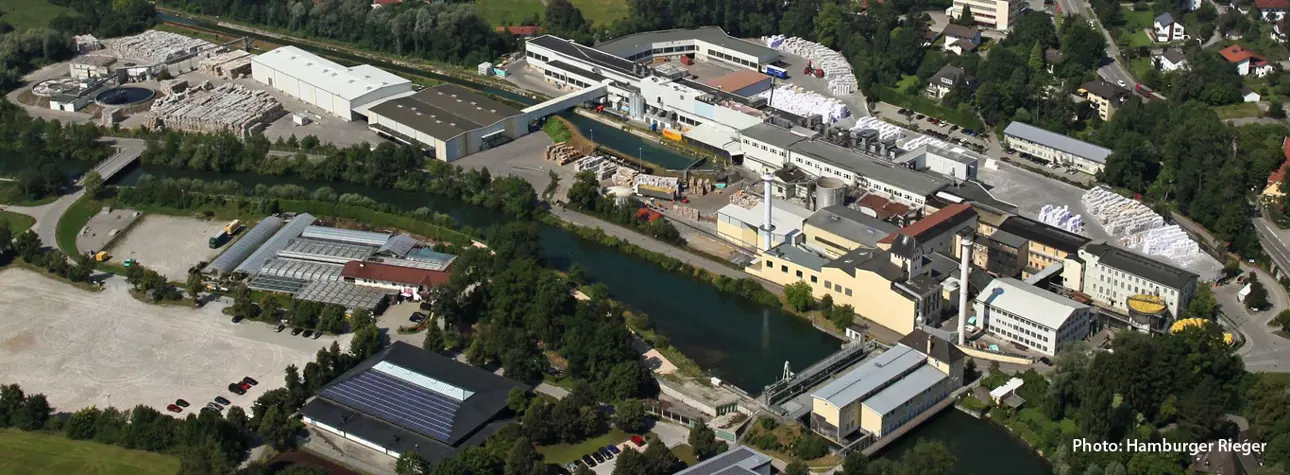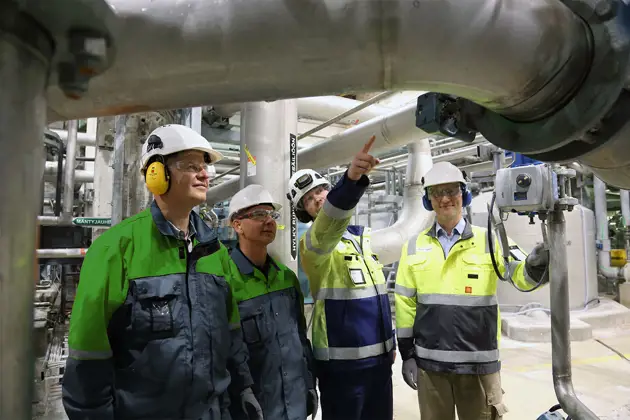Automatic monitoring saves time and money at Hamburger Rieger
Jan 2, 2014
Hamburger Rieger turns to intelligent technology from Valmet for its PM 2 steam and condensate system.

White container board is the ultimate raw material in the packaging sector. Rieger Liner DC is made from the highest quality recycling paper and is the best test liner currently available on the market. The manufacture of this packaging paper makes long-established firm Hamburger Rieger a market leader in white test liner. One of its latest innovations is the rigorous automatic online valve condition monitoring in its steam and condensate system. This intelligent technology provided by Valmet Flow Control business line (former Neles) saves both time and costs. Its high level of availability plays an essential part in enabling the PM 2 paper machine in Trostberg to produce 400 tons of the popular Rieger papers each day.
“The ND9000™ works reliably even under these unfavorable conditions, and most of all, this technology saves us a lot of time and expense.” - Josef Egginger, foreman at Hamburger Rieger in Trostberg.
Product and process innovations are becoming more and more important in the packaging industry. The principal objectives are to improve process flows within production and to make efficient use of resources, especially considering the rising pressure in terms of both costs and competition. While end consumers are increasingly encouraged to buy through visual means, such as attractive packaging, the packaging specialists have to deal with the fact that raw materials are becoming both more expensive and scarcer. In short, the market is fiercely competitive, but at the same time, offers good opportunities for companies that can face current and future challenges with technologically efficient solutions.
Two areas in particular are the cost drivers in paper manufacturing: raw materials in the form of wood or recycling paper, and the generation and consumption of steam for the steam and condensate system. At its Trostberg location in Bavaria, paper specialist Hamburger Rieger produces white corrugated board and Rieger Liner DC test liner, and just like the product, both the raw materials that are used and the production methods applied are the top of the range. Hamburger Rieger skillfully combines tradition, innovation and expertise to achieve a high level of quality, which ensures success for both the company and the customers for its paper in equal measure. The “RiegerLiner” brand paper leaves an impression with its consistently bright white surface, offering maximum sheen and ideal smoothness.
The coated white top liners with basic weights of 120 to 230 gsm are produced on the PM 2, a four-layer Fourdrinier machine that was developed in 1992 as an innovative conversion of the previous BM 1. With an operating speed of 1,000 meters per minute, PM 2 produces 140,000 tons of coated paper a year. Excluding scheduled downtime for one major service each year, the machine runs around the clock, day in, day out. High levels of reliability and availability are therefore indispensable. Every small disruption or web break means lost time and money. This is particularly evident in the dryer section, which accounts for about two-thirds of the entire machine in terms of size, cost and energy consumption.
Energy consumption – biggest expenditure
“A huge amount of energy is needed to reduce the moisture content from 48% following the press section to the remaining 8%,” says Josef Egginger, who is in charge of measurement and control technology in Trostberg. The paper layer runs in slalom fashion over 60 drying cylinders that are driven in groups of a few together and are fed from a steam and condensate system. The biggest single expenditure in a paper mill is on the energy consumption needed for drying, which is also extremely important in terms of achieving a good product outcome. “That is why faultless valve operation plays such an important role in the steam and condensate system,” comments Egginger. “The temperatures of the individual drying surfaces and the pressures on the cylinders have to be controlled with the utmost precision.”
One-and-a-half tons of steam are required to manufacture one ton of paper. The steam is generated in an in-house boiler room and fed by pipes to the paper machine. About 60 control valves ensure that pressure and temperature are precisely controlled, all integrated into a continuous condition monitoring system. Since 2007, Hamburger Rieger has gradually introduced control valves with intelligent valve controllers of the ND9000™ series at its Trostberg location.

Automation prevents waste
It is essential to prevent disruptions to the steam and condensate system because these can cause problems, such as web breaks. However, the worst conceivable case would be the complete failure of a valve in the main evaporation zone. This would result in machine downtime lasting several hours, according to the foreman, because the defective components would have to be left for a certain length of time to cool down before they could be replaced, on account of their high operating temperatures. However, insidious faults also have expensive consequences. Thus, valves that open too widely can easily cause a waste of energy if the steam “blows out” instead of being directed to the paper layer for drying.
Depending on paper thickness, production speed and width of the paper layer, about 25 tons of steam per hour is needed to dry the paper. At about EUR 25 per ton of steam, these outgoings rapidly escalate into the millions over the year. The potential for savings in this area can take advantage of using intelligent controls and online monitoring of valve performance. “If steam consumption increases beyond the normal level, the reason may lie in valve or controller malfunction. The only problematic aspect is that this is often an insidious process. Without permanent monitoring, we would have identified these errors only after an actual failure had occurred,” Egginger says.
The “online diagnostics” function of the Valve Manager software provides a rapid overview of the current performance and the nominal and actual valve settings. Continuous condition monitoring system shows at a glance the device status of about 60 control valves in use and incorporated into the system. This significantly simplifies and shortens troubleshooting procedures.
Troubleshooting at a glance
Josef Egginger knows these challenges from many years of experience. Before the intelligent valve controllers were introduced, staff usually had to deal with the machines at least once a week. The only way to check each individual valve and controller was on-site in permanently high ambient temperatures of about 50°C, air with a high dust content and high atmospheric humidity. “The ND9000™ works reliably even under these unfavorable conditions, and most of all, this technology saves us a lot of time and expense. Instead of employing two staff members to spend an hour troubleshooting on the machine, it is now enough for one staff member to spend two minutes on the PC in the workshop reviewing the device status. That has already become a habit, just like checking the e-mails in the morning,” emphasizes Egginger.
This quick and easy monitoring and diagnostic capabilities are based mainly on 3rd generation valve diagnostics. For instance, the performance view contained in the Valve Manager, the new ND9000™ DTM, shows the level of wear to the various components (valve, actuator, valve controller), ambient conditions (supply pressure and temperature) and general control performance in easy-to-follow bar graph form. If performance now worsens, this will be displayed when a warning limit or alarm limit is reached. A report interprets the individual diagnoses and provides the user with indications of the cause and how to resolve the error.
In this way, the information that is supplied supports both preventive and status-based maintenance, as well as allows the appropriate measures and procurement of spare parts to be planned at an early stage. “There is no comparable product on the market. Our employees in the technology area realize what advantages this valve controller and software system offer. In our view, this investment is definitely paying off,” confirms Egginger. “We have therefore set ourselves the goal of fitting all of the valves used in the steam and condensate area with the Neles™ ND9000™ by a process of gradual expansion and incorporating them in Condition Monitoring System.”
-----------------------------------------------------------
Hamburger Rieger: The market leader in white
In 2012, Hamburger Rieger celebrated the 100th anniversary of the Rieger plant in Trostberg (Bavaria). The business was taken over by W. Hamburger GmbH in 1989. Hamburger Rieger is a member of the Hamburger Containerboard group of companies, which is one of the main producers of high-quality containerboard in Europe, with output of over 1.5 million tons. The quality leader in the white paper market produces about 450,000 tons of paper a year. In Trostberg, coated paper is manufactured on the PM 2 and on BM 1, a nine-layer cylinder paper machine, and uncoated paper is produced at Spremberg, in Brandenburg. The key factors in its success are constant development and improvement to the paper surface, the raw materials used and running quality in the process. As a company that is passionate about papermaking, Hamburger Rieger is the center of competence for white test liner and supplies papers for high-quality printability. Since 2011, its paper varieties have carried the globally recognized FSC® certificate.
-----------------------------------------------------------
Text by Ursula Gehl
Article published in Results Automation 2/2014
Text originally published in 2014, and slightly updated in April 2022, due to the company name change to Valmet.

Subscribe to our newsletter
Subscribe now to flow control newsletter and receive the latest insights directly to your email.
SubscribeRead more pulp and paper stories


